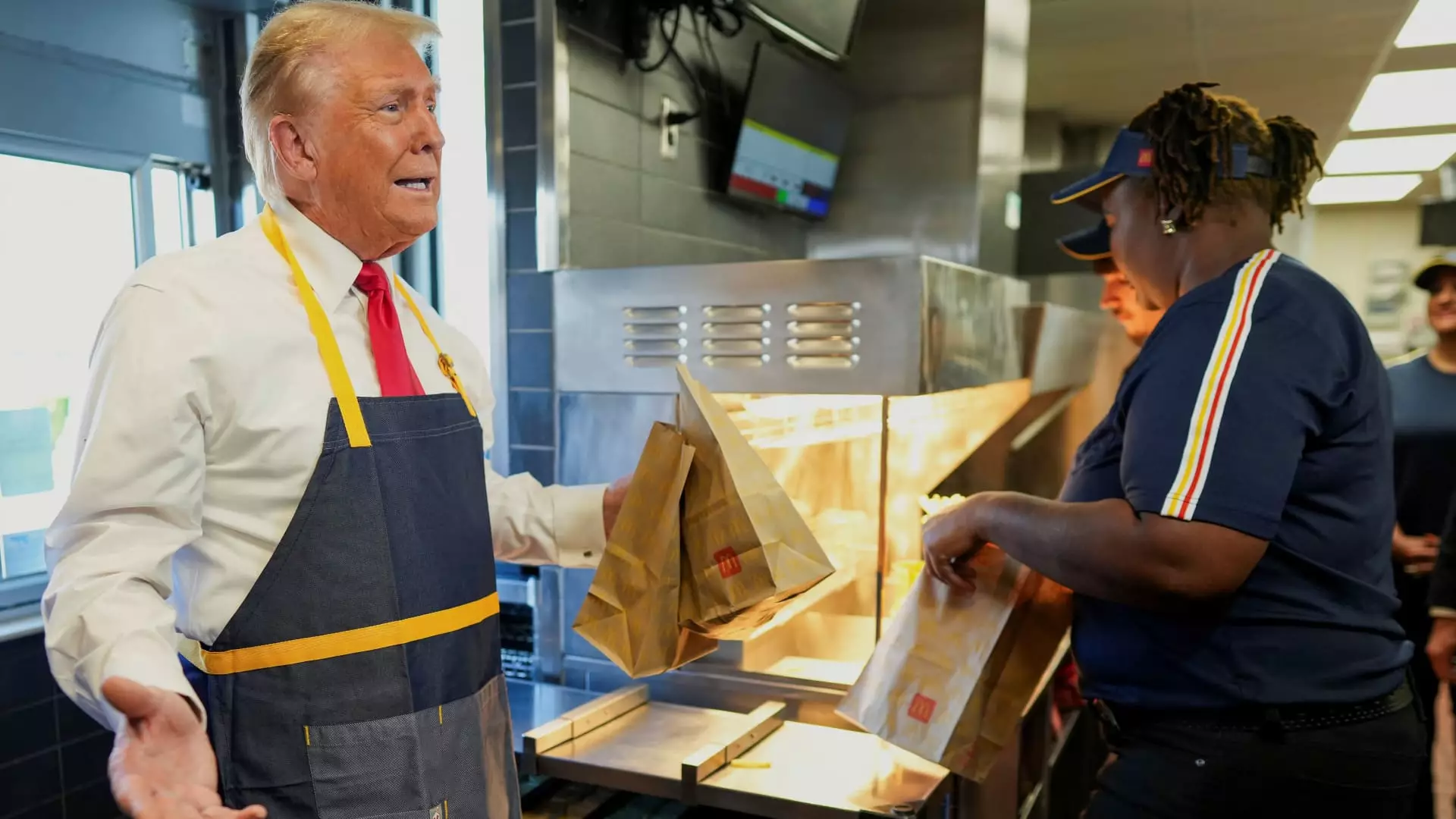As the presidential race tightens, corporations often find themselves caught in a delicate balancing act. This was exemplified recently when former President Donald Trump made a notable visit to a McDonald’s location in Pennsylvania. While this event undoubtedly generated buzz, the fast-food chain is consciously attempting to maintain its neutrality in the political arena. The challenge lies not only in navigating political conversations but also in preserving the brand’s wide appeal across a diverse customer base.
In an internal communication that surfaced, McDonald’s officials emphasized their intent to refrain from endorsing any presidential candidates. The memo highlighted the company’s longstanding position of political neutrality, essentially stating, “McDonald’s does not endorse candidates for elected office.” This declaration underscores the brand’s strategy to remain nonpartisan, especially given that a significant portion of its customer demographic is disillusioned by overt political affiliations.
The corporate statement indicates that the attention garnered from this election is not sought by the company, but rather a reflection of its deep-rooted connection with the American public. This connection is a double-edged sword; while it’s flattering for McDonald’s that it triggers discussions, it also poses risks of alienating customers who might not align with the political views associated with the promotional antics of high-profile figures like Trump.
During his visit, Trump undertook the role of a temporary employee, learning to operate a fry cooker and work the drive-thru. However, this ostensibly light-hearted engagement became a platform for him to take jabs at Vice President Kamala Harris regarding her claims of having worked at McDonald’s in her younger years. Trump’s unfounded allegations against Harris—while devoid of concrete evidence—serve to illustrate the increasing weaponization of political narratives in the media landscape.
It is noteworthy that while McDonald’s encourages an inclusive environment, Trump’s commentary stirs the pot of political division. The company’s internal message reinforced the idea of inclusivity, noting their “opened doors to everyone.” However, the context surrounding Trump’s visit, combined with ongoing criticisms and challenges facing the franchise, raises questions about whether this inclusiveness truly translates in practice.
McDonald’s has historically sought to balance its corporate identity with social responsibility. Following their public support for the Black Lives Matter movement in 2020, the corporation is now navigating a more cautious approach, seeking to avoid polarizing customers. This pivot mirrors a broader trend in Corporate America where many brands are toning down their public stances on political and social issues, demonstrating an understanding that contentious issues can lead to customer backlash.
As part of this trend, a recent Gallup-University of Bentley study indicated that public sentiment is shifting; only 38% of Americans believe businesses should engage in political discourse, down substantially from previous years. Thus, for a global brand like McDonald’s, staying apolitical seems increasingly prudent, especially as political affiliations can influence consumer choice.
The company is also not unfamiliar with controversies, as evidenced by public outcry over rising prices which have been perceived to reflect broader economic issues. In recent months, social media users lambasted the affordability of McDonald’s menu items, prompting Republicans to align the issue with dissatisfaction towards the current administration’s economic policy. This shows that consumer sentiment can often be shaped by political ideologies—a perilous path for a brand aiming for neutrality.
In response to price criticisms, McDonald’s U.S. President Joe Erlinger wrote an open letter addressing the rising costs and revealing factual information about their pricing structure. However, uniting a diverse clientele amidst varying economic opinions poses an ongoing challenge for the franchise.
McDonald’s attempts to navigate its role as both a cultural icon and a business entity amid a politically charged atmosphere. The intersection of fast food and politics highlights the difficulties companies face when trying to remain impartial. As the electoral cycle progresses, McDonald’s will need to continuously assess its brand strategy to stay aligned with consumer expectations while maintaining its identity—an endeavor that reveals the complexities of modern corporate responsibility.


Leave a Reply